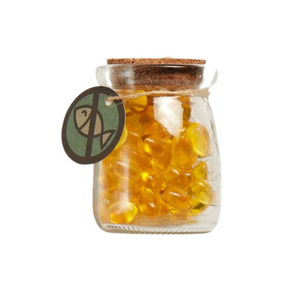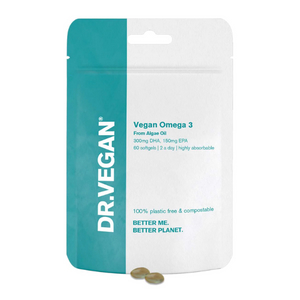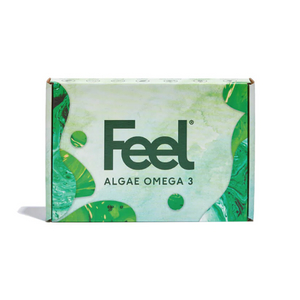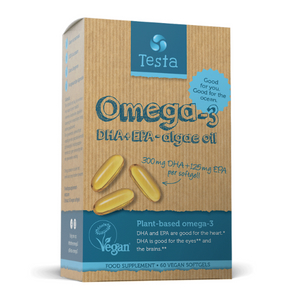NothingFishy Reviews 2024: Is This Vegan Algae Omega 3 Good?
All articles are produced independently. When you click our links for purchasing products, we earn an affiliate commission. Learn more about how we earn revenue by reading our advertise disclaimer.

9.0
Quality
8.5
Support Research
7.0
Reputation
9.0
Price
Features
- High-dose DHA.
- Comes in a reusable glass jar.
- Refill service reduces packaging.
- Reasonable price.
Brand Information
- UK-based company.
- Founded in 2017 by Caine Woodward.
- Acquired by The Mothership in 2022.
Medical Benefits
- Supports healthy pregnancy and lactation.
- Supports heart health.
- Reduced risk of cardiovascular diseases.
- Might slow cognitive decline.
- Might reduce the risk of dementia.
- Might improve vision.
About The Brand
NothingFishy—or Nothing Fishy—is a UK company founded in 2017 by entrepreneur Caine Woodward. In 2022, the company was acquired by the eCommerce platform The Mothership.
Nothing Fishy sells one product: vegan omega-3 fatty acids sourced from sustainable algae rather than fish oils.
What Is NothingFishy Vegan Omega 3?
Nothing Fishy is a vegan omega-3 supplement providing 200 milligrams of essential fatty acids as docosahexaenoic acid, or DHA, delivered in a glass jar of easy-to-swallow vegan softgels.
Omega-3 is one of the main essential fatty acids, with DHA being the most prevalent type in fish oils and the human brain. The main food source of DHA is fish, so it’s important to supplement on a plant-based diet because plant foods don’t contain DHA.
However, unlike other vegan omega-3 brands, Nothing Fishy only provides one type of omega-3. It’s a reasonably priced vegan omega-3 supplement, but if you’re going to take omega-3s consistently you’ll want to know whether they have a real impact on your brain and body.
Read on for our verdict on this supplement, including the quality, price, pros and cons, alternative omega-3 supplements, and Nothing Fishy reviews from real customers.
Feature Product & Coupon

Best Reputation
NothingFishy
- High-dose DHA.
- Comes in a reusable glass jar.
- Refill service reduces packaging.
- Reasonable price.
Does It Really Work?
Omega-3 fatty acids are an essential nutrient crucial for cognition, mood regulation, foetal development during pregnancy, and brain development in young children.
Omega-3-rich foods include chia seeds, flaxseeds, walnuts, fatty fish, and fish oils.
However, plant-based foods only provide omega-3 fatty acids as alpha-linolenic acid or ALA, which must be converted into the fatty acids eicosapentaenoic acid, or EPA, and DHA—the types present in fish oils and what your brain needs.
Humans can convert some ALA but vegans and vegetarians—or anyone who doesn’t eat fish—might need to supplement extra EPA and DHA for optimal brain function.
Does Nothing Fishy live up to the job?
Pros
- Refill service reduces packaging.
- High-dose DHA from algae.
- Affordable.
- Comes in a reusable glass jar.
Cons
- Subscription is hard to cancel.
- No EPA.
- Contains carrageenan.
- No ingredients to protect omega-3 from oxidation.
- Unsure of the quality.
NothingFishy Omega 3 Ingredients
Each Nothing Fishy vegan softgel capsule provides 200 milligrams of DHA fatty acids from algal oil in a base of vitamin E oil. It doesn’t provide other important forms of omega-3 fatty acids, but studies suggest that supplementing DHA naturally raises the levels of the other fatty acids too.
This supplement contains carrageenan, which might negatively affect the gut, but it’s almost impossible to find an algae omega-3 supplement without carrageenan, so there aren’t many better alternatives.

DHA Algae Oil
The main ingredient is DHA fatty acids, which are critical for the brain—especially for growing brains in children and for maintaining cognitive function in the elderly.
This DHA-rich algal oil is sourced from sustainable algae—the only natural plant-based source of DHA.
DHA usually comes from fish, but fish don’t synthesize their own omega-3[1]—they get it by consuming algae. The idea behind algal oil supplements is to get the omega-3 fatty acids directly from algae rather than via fish.
There are various species[2] of omega-3-rich algae, and this algal oil comes from algae found in coastal waters called Schizochytrium sp. However, the algal oil used by Nothing Fishy does not come from the sea—instead, the algae are grown in sustainable algae farms.
Vitamin E oil should act as an antioxidant and protect the algae omega-3 from oxidation, extending its shelf-life and preventing it from becoming rancid. However, this supplement doesn’t contain other antioxidants shown to preserve omega-3[3] supplements.
Glycerol
Also called glycerine or E442, glycerol is an ingredient in vegan softgels to make the capsule soft and flexible. It’s also a non-toxic thickener and preservative and acts as a lubricant, making softgels easier to swallow.
Starch
Gelatin is usually used to make softgels, but it’s not vegan, so modified starch is used instead, combined with glycerol and carrageenan.
Euchema Seaweed
This is another word for carrageenan, or E407, and is a vegan alternative to gelatin. However, it’s an ingredient that many people try to avoid.
Carrageenan is extracted from seaweed and used for making vegan softgel capsules because it forms a gel at room temperature.
It’s considered non-toxic[4] and “generally safe” by the United States Food and Drug Administration, FDA. The European Food Safety Authority, or EFSA, also found “no evidence of any adverse effects in humans.”[5]
However, the fate of carrageenan after digestion[6] is unclear. In the European Union, carrageenan is prohibited from being used in infant formula for precautionary reasons.
Moreover, carrageenan might promote inflammation and change the gut microbiome.[7] Animal studies suggest that carrageenan triggers intestinal inflammation,[8] although there’s no evidence of this effect in low doses.
Hence, further research is recommended—especially for those susceptible to the immune-activating effects, such as the elderly and people with inflammatory bowel disease.[9]
Alternatives To NothingFishy

DR. VEGAN Vegan Omega 3
- Provides DHA and EPA.
- No carrageenan.
- Plastic-free packaging.
- Low dose of DHA and EPA per capsule.

Feel Omega 3
- Provides DHA and EPA.
- No carrageenan.
- Contains rosemary extract to protect the omega-3 from oxidation.
- Low dose of DHA and EPA per capsule.
- Provided in a normal cellulose capsule rather than a softgel capsule.

Testa DHA & EPA Omega-3 Algae Oil
- High dose of DHA and EPA.
- Only need to take one capsule per day.
- Contains rosemary extract to protect the omega-3 from oxidation.
- Contains carrageenan.
Health Benefits Of NothingFishy Vegan Omega 3
Omega-3 is an essential fatty acid, and studies show that it’s important for vision, heart health, and brain function—especially in vegans or those who don’t eat fish.
Here are some of the main benefits of supplementing algae omega-3.
Supports Healthy Pregnancy
Omega-3 fatty acids are crucial for fetal development,[10] so it’s critical that mothers get enough omega-3 fatty acids from their diet.
Sadly, women consuming less than 150 milligrams of DHA fatty acids daily are deficient and more likely to suffer an early preterm birth.[11]
Supplementing a high dose of 800–1000 milligrams of DHA fatty acids daily significantly reduced the rate of preterm births in these deficient women. A 1000-milligram dose is also associated with fewer serious adverse events[12] during pregnancy and birth.
Furthermore, studies show mothers should consume 650 milligrams of DHA fatty acids daily during pregnancy to achieve optimal DHA status in the infant[13] at birth.
Not vegan? This applies to omnivores, too. Even in non-vegan mothers, supplementing DHA significantly increases fatty acids in the blood and breast milk[14] of lactating women.
Mothers who have genetic variations that reduce the conversion of dietary omega-3 into DHA[15] might benefit most from supplementation. So it’s worth considering taking a DHA supplement—even if you’re not vegan or vegetarian.
Supports Brain And Cognition
DHA is essential for cognition at all stages of life. Supplementing omega-3 improves brain blood flow,[16] learning, and memory—especially in the elderly.[17]
While all omega fatty acids are important, DHA is the dominant omega fat in the brain and is required to build neurons,[18] information messengers that transmit signals to different areas of the brain.
In fact, most research has been done on DHA omega fatty acids rather than EPA and ALA. However, this does not mean that the positive effects come solely from DHA.
Studies show that supplementing DHA also increases EPA levels by reducing our body’s conversion of EPA to DHA. Hence, the benefits might come from higher DHA, higher EPA, or a combination.
So, how much DHA do you need to take for brain function in older age? That might depend on your genetics.
Reduces Dementia Risk
A gene mutation associated with faster cognitive decline and Alzheimer’s disease is APOE4.
Those with this gene variant seem to have a higher turnover[19] and reduced brain delivery of DHA[20] and hence need more DHA. But how much should you supplement if you have this gene?
One small study found that supplementing over 2,000 milligrams of DHA daily for six months significantly increased both DHA and EPA levels in the brain[20]—irrespective of APOE genotype.
However, non-APOE4 carriers had three times the amount of EPA compared to APOE4 carriers, suggesting significantly worse delivery of omega fats to the brain in APOE4 carriers.
The study concluded that supplementing less than one gram of DHA daily might not be enough to prevent dementia in those with APOE4.
Helps Maintain Heart Health
You’re at higher risk for heart disease if you have high cholesterol or high blood pressure.
Supplementing omega-3 might help reduce blood fat levels,[21] and since 2019, the FDA has claimed that omega-3 supplements might reduce blood pressure and the risk of heart disease.[22]
However, this claim only applies to combined EPA and DHA omega-3 supplements. Also, a 2021 meta-analysis suggests that EPA is more effective in reducing cardiovascular risk[23] than DHA.
Nonetheless, further studies suggest that supplementing three grams of DHA is more effective at reducing blood pressure[24] than EPA.
Reduces The Risk Of Some Eye Diseases
DHA has antioxidant and neuroprotective properties that can counteract oxidative damage in eye diseases.[25]
Even if you eat fish, studies show that supplementing 1,000 milligrams of DHA daily might benefit diabetic retinopathy, age-related macular degeneration, and glaucoma.
For instance, supplementing DHA for three months significantly improved vision[26] in those with glaucoma.
Are There Any Side Effects?
There are unlikely to be any serious side effects from omega-3 algal oil supplements at the recommended dose. However, some potential side effects might include:
Increased Risk Of Atrial Fibrillation And Bleeding
Supplementing with omega-3 might increase the risk of atrial fibrillation – an abnormally fast heart rate – and bleeding,[27] although this risk is higher with EPA rather than DHA.
Weight Gain
Studies suggest that supplementing DHA reduces the metabolic rate[28] by 7% in women, which could lead to weight gain as fewer calories are used by the body.
Conversely, other studies suggest that supplementing DHA might reduce slightly body weight in overweight individuals.[29]
Contamination
Some strains of this algae might have high levels of toxins, and we do not know the exact strain of Schizochytrium sp. used in this particular supplement.
Nevertheless, toxicological studies on the algal oil obtained from various strains of this algae suggest there are no toxicological concerns.[30]
Exacerbation Of Inflammatory Bowel Disease
Carrageenan might promote immune response and inflammation in inflammatory bowel disease. However, the dose of carrageenan in this supplement is likely too low to have a significant effect.
Dosage
We recommend taking one to two algal oil softgels per day with food, providing 200–400 milligrams of DHA daily.
You might need a larger dose for some benefits, though. For example, some studies suggest taking up to 1,000 milligrams daily during pregnancy or up to three grams daily for high blood pressure.
Supplementing even more than the recommended three grams per day of omega-3 might benefit those at an increased risk of cardiovascular disease.[31] However, the safety of taking algal oil at such high doses hasn’t been confirmed.
Even for those who eat fish, the FDA advises a maximum dose of three grams of omega-3 daily from supplements and diet combined and no more than two grams of supplemental omega-3 daily.
As of 2022, the EFSA states that it’s safe for adults to consume up to one gram of supplemental DHA from algae[32] daily. This excludes pregnant and lactating women.
Most people find it easiest to take supplements every morning with breakfast, but you can take them any time of day that suits you.
Nothing Fishy Review: What Do Real Users Say?
Based on customer reviews, the company claims that their users begin to notice a positive difference after taking algal oil for one to two months. However, this will differ from person to person. However, multiple customers complained of poor customer service.
Here are some real Nothing Fishy omega-3 reviews from Trustpilot and Amazon:
“Been using these omega 3’s from Nothing Fishy a couple of months now, I’ve just signed up for a 60-day subscription, they have really helped my itchy skin & with dryness, hair feels better too.”
Linda Pyrah, Trustpilot
“I really don’t like giving poor reviews but I feel so angry with the terrible customer service I have received. I emailed to request that my order be cancelled because I couldn’t work out how to do this online. Two months later received more of the product and was charged. Emailed numerous times and still haven’t received one response.”
Ella, Trustpilot
“These are easy to swallow (I often have a problem with larger capsules) and great that they’re vegan and packed in a very environmentally friendly way.” –
Sally, Amazon.co.uk
“I liked the product, but unlikely to buy again because it only seems to contain DHA and not EPA. According to a few sources of independent advice, Omega 3 supplements should contain both, which some other algae-based supplements provide.”
RM, Amazon.co.uk
Final Thought
Nothing Fishy is a vegan omega-3 supplement providing 200 milligrams of DHA, the most important form of omega-3 in the body and brain. It’s derived from algal oil and available as easy-to-swallow softgels in sustainable packaging.
These omega-3 softgels do not provide EPA, another long-chain omega-3 fatty acid. However, studies suggest that supplementing DHA also increases EPA levels in the body.
We especially like Nothing Fishy’s focus on sustainable algae production and packaging. Your first order of softgels will come with a glass jar; then you can order refill packages in recyclable “eco-bag” packaging.
The price is also very reasonable. Ordering online, a glass jar of 60 softgels costs £22.00, while 120 softgels cost £40.00.
You can also subscribe online on their website for £16.00 per month, which delivers 60 softgels every 30 days in recyclable paper packaging.
If you’re curious about starting omega-3 supplements, speak to your doctor to determine what is best for you.
Frequently Asked Questions
This is an algal oil supplement providing a vegan source of DHA, an important type of omega-3. However, they do not publish third-party test results, so it’s hard to verify the quality of the supplement.
Studies suggest that algal oil omega-3 supplements are as effective as fish oils at raising omega-3 status.
Most sources recommend taking 200-400 milligrams of DHA daily.
It’s recommended for healthy adults to take up to one gram of supplemental DHA daily.
Omega-3 can improve pregnancy outcomes, fetal development, heart health, vision, and cognition.
+ 32 sources
Health Canal avoids using tertiary references. We have strict sourcing guidelines and rely on peer-reviewed studies, academic researches from medical associations and institutions. To ensure the accuracy of articles in Health Canal, you can read more about the editorial process here
- Adarme-Vega, T.C., Thomas-Hall, S.R. and Schenk, P.M. (2014). Towards sustainable sources for omega-3 fatty acids production. Current Opinion in Biotechnology, [online] 26, pp.14–18. doi:https://doi.org/10.1016/j.copbio.2013.08.003.
- Adarme-Vega, T.C., Lim, D.K.Y., Timmins, M., Vernen, F., Li, Y. and Schenk, P.M. (2012). Microalgal biofactories: a promising approach towards sustainable omega-3 fatty acid production. Microbial Cell Factories, [online] 11(1). doi:https://doi.org/10.1186/1475-2859-11-96.
- Bhale, S.D., Xu, Z., Prinyawiwatkul, W., King, J.M. and Godber, J.S. (2007). Oregano and Rosemary Extracts Inhibit Oxidation of Long-Chain n-3 Fatty Acids in Menhaden Oil. Journal of Food Science, [online] 72(9), pp.C504–C508. doi:https://doi.org/10.1111/j.1750-3841.2007.00569.x.
- Younes, M., Aggett, P., Aguilar, F., Crebelli, R., Filipič, M., Frutos, M.J., Galtier, P., Gott, D., Gundert‐Remy, U., Kuhnle, G.G., Lambré, C., Leblanc, J., Lillegaard, I.T., Moldeus, P., Mortensen, A., Oskarsson, A., Stankovic, I., Waalkens‐Berendsen, I., Woutersen, R.A. and Wright, M. (2018). Re‐evaluation of carrageenan (E 407) and processed Eucheuma seaweed (E 407a) as food additives. EFSA Journal, [online] 16(4). doi:https://doi.org/10.2903/j.efsa.2018.5238.
- Scientific Committee on Food SCF/CS/ADD/EMU/199 Final Opinion of the Scientific Committee on Food on Carrageenan. (2003). Available at: https://ec.europa.eu/food/fs/sc/scf/out164_en.pdf
- David, S., Shani Levi, C., Fahoum, L., Ungar, Y., Meyron-Holtz, E.G., Shpigelman, A. and Lesmes, U. (2018). Revisiting the carrageenan controversy: do we really understand the digestive fate and safety of carrageenan in our foods? Food & Function, [online] 9(3), pp.1344–1352. doi:https://doi.org/10.1039/c7fo01721a.
- De Siena, M., Raoul, P., Costantini, L., Scarpellini, E., Cintoni, M., Gasbarrini, A., Rinninella, E. and Mele, M.C. (2022). Food Emulsifiers and Metabolic Syndrome: The Role of the Gut Microbiota. Foods, [online] 11(15), p.2205. doi:https://doi.org/10.3390/foods11152205.
- Pogozhykh, D., Posokhov, Y., Myasoedov, V., Gubina-Vakulyck, G., Chumachenko, T., Knigavko, O., Polikarpova, H., Kalashnyk-Vakulenko, Y., Sharashydze, K., Nakonechna, O., Prokopyuk, V., Onishchenko, A. and Tkachenko, A. (2021). Experimental Evaluation of Food-Grade Semi-Refined Carrageenan Toxicity. International Journal of Molecular Sciences, [online] 22(20), p.11178. doi:https://doi.org/10.3390/ijms222011178.
- Borsani, B., De Santis, R., Perico, V., Penagini, F., Pendezza, E., Dilillo, D., Bosetti, A., Zuccotti, G.V. and D’Auria, E. (2021). The Role of Carrageenan in Inflammatory Bowel Diseases and Allergic Reactions: Where Do We Stand? Nutrients, [online] 13(10), p.3402. doi:https://doi.org/10.3390/nu13103402.
- Massari, M., Novielli, C., Mandò, C., Di Francesco, S., Della Porta, M., Cazzola, R., Panteghini, M., Savasi, V., Maggini, S., Schaefer, E. and Cetin, I. (2020). Multiple Micronutrients and Docosahexaenoic Acid Supplementation during Pregnancy: A Randomized Controlled Study. Nutrients, [online] 12(8), p.2432. doi:https://doi.org/10.3390/nu12082432.
- Christifano, D.N., Crawford, S.A., Lee, G., Brown, A.R., Camargo, J.T., Kerling, E.H., Gajewski, B.J., Valentine, C.J., Gustafson, K.M., DeFranco, E.A. and Carlson, S.E. (2023). Docosahexaenoic acid (DHA) intake estimated from a 7-question survey identifies pregnancies most likely to benefit from high-dose DHA supplementation. Clinical Nutrition ESPEN, [online] 53, pp.93–99. doi:https://doi.org/10.1016/j.clnesp.2022.12.004.
- Carlson, S.E., Gajewski, B.J., Valentine, C.J., Kerling, E.H., Weiner, C.P., Cackovic, M., Buhimschi, C.S., Rogers, L.K., Sands, S.A., Brown, A.R., Mudaranthakam, D.P., Crawford, S.A. and DeFranco, E.A. (2021). Higher dose docosahexaenoic acid supplementation during pregnancy and early preterm birth: A randomised, double-blind, adaptive-design superiority trial. EClinicalMedicine, [online] 36, p.100905. doi:https://doi.org/10.1016/j.eclinm.2021.100905.
- Christifano, D.N., Gustafson, K.M., Carlson, S.E., Sultanna, N., Brown, A., Sands, S.A., Colombo, J. and Gajewski, B.J. (2022). Maternal Docosahexaenoic Acid Exposure Needed to Achieve Maternal–Newborn EQ. Nutrients, [online] 14(16), p.3300. doi:https://doi.org/10.3390/nu14163300.
- Yang, Y., Li, G., Li, F., Xu, F., Hu, P., Xie, Z., Lu, X., Ding, Y. and Wang, Z. (2022). Impact of DHA from Algal Oil on the Breast Milk DHA Levels of Lactating Women: A Randomized Controlled Trial in China. Nutrients, [online] 14(16), p.3410. doi:https://doi.org/10.3390/nu14163410.
- Li, P., Chen, Y., Song, J., Yan, L., Tang, T., Wang, R., Fan, X., Zhao, Y. and Qi, K. (2022). Maternal DHA-rich n-3 PUFAs supplementation interacts with FADS genotypes to influence the profiles of PUFAs in the colostrum among Chinese Han population: a birth cohort study. Nutrition & Metabolism, [online] 19(1). doi:https://doi.org/10.1186/s12986-022-00683-3.
- Dighriri, I.M., Alsubaie, A.M., Hakami, F.M., Hamithi, D.M., Alshekh, M.M., Khobrani, F.A., Dalak, F.E., Hakami, A.A., Alsueaadi, E.H., Alsaawi, L.S., Alshammari, S.F., Alqahtani, A.S., Alawi, I.A., Aljuaid, A.A. and Tawhari, M.Q. (2022). Effects of Omega-3 Polyunsaturated Fatty Acids on Brain Functions: A Systematic Review. Cureus. [online] doi:https://doi.org/10.7759/cureus.30091.
- Maltais, M., Lorrain, D., Léveillé, P., Viens, I., Vachon, A., Houeto, A., Presse, N. and Plourde, M. (2022). Long-chain Omega-3 fatty acids supplementation and cognitive performance throughout adulthood: A 6-month randomized controlled trial. Prostaglandins, Leukotrienes and Essential Fatty Acids, [online] 178, p.102415. doi:https://doi.org/10.1016/j.plefa.2022.102415.
- Fang, X., Sun, W., Jeon, J., Azain, M., Kinder, H., Ahn, J., Chung, H.C., Mote, R.S., Filipov, N.M., Zhao, Q., Rayalam, S. and Park, H.J. (2020). Perinatal Docosahexaenoic Acid Supplementation Improves Cognition and Alters Brain Functional Organization in Piglets. Nutrients, [online] 12(7), p.2090. doi:https://doi.org/10.3390/nu12072090.
- Bazinet, R.P., Metherel, A.H., Chen, C.T., Shaikh, S.R., Nadjar, A., Joffre, C. and Layé, S. (2020). Brain eicosapentaenoic acid metabolism as a lead for novel therapeutics in major depression. Brain, Behavior, and Immunity, [online] 85, pp.21–28. doi:https://doi.org/10.1016/j.bbi.2019.07.001.
- Arellanes, I.C., Choe, N., Solomon, V., He, X., Kavin, B., Martinez, A.E., Kono, N., Buennagel, D.P., Hazra, N., Kim, G., D’Orazio, L.M., McCleary, C., Sagare, A., Zlokovic, B.V., Hodis, H.N., Mack, W.J., Chui, H.C., Harrington, M.G., Braskie, M.N. and Schneider, L.S. (2020). Brain delivery of supplemental docosahexaenoic acid (DHA): A randomized placebo-controlled clinical trial. eBioMedicine, [online] 59, p.102883. doi:https://doi.org/10.1016/j.ebiom.2020.102883.
- Li, J.-J., Dou, K.-F., Zhou, Z.-G., Zhao, D., Ye, P., Zhao, J.-J. and Guo, L.-X. (2022). Role of omega-3 fatty acids in the prevention and treatment of cardiovascular Diseases: A consensus statement from the Experts’ Committee Of National Society Of Cardiometabolic Medicine. Frontiers in Pharmacology, [online] 13. doi:https://doi.org/10.3389/fphar.2022.1069992.
- Center (2020). New Qualified Health Claims for EPA and DHA Omega-3. [online] U.S. Food and Drug Administration. Available at: https://www.fda.gov/food/cfsan-constituent-updates/fda-announces-new-qualified-health-claims-epa-and-dha-omega-3-consumption-and-risk-hypertension-and
- Khan, S.U., Lone, A.N., Khan, M.S., Virani, S.S., Blumenthal, R.S., Nasir, K., Miller, M., Michos, E.D., Ballantyne, C.M., Boden, W.E. and Bhatt, D.L. (2021). Effect of omega-3 fatty acids on cardiovascular outcomes: A systematic review and meta-analysis. eClinicalMedicine, [online] 38, p.100997. doi:https://doi.org/10.1016/j.eclinm.2021.100997.
- Lee, J.B., Notay, K., Klingel, S.L., Chabowski, A., Mutch, D.M. and Millar, P.J. (2019). Docosahexaenoic acid reduces resting blood pressure but increases muscle sympathetic outflow compared with eicosapentaenoic acid in healthy men and women. American Journal of Physiology-Heart and Circulatory Physiology, [online] 316(4), pp.H873–H881. doi:https://doi.org/10.1152/ajpheart.00677.2018.
- Lafuente, M., Rodríguez González-Herrero, M.E., Romeo Villadóniga, S. and Domingo, J.C. (2021). Antioxidant Activity and Neuroprotective Role of Docosahexaenoic Acid (DHA) Supplementation in Eye Diseases That Can Lead to Blindness: A Narrative Review. Antioxidants, [online] 10(3), p.386. doi:https://doi.org/10.3390/antiox10030386.
- Anton, A., Garcia, V., Muñoz, M., Gonzales, K., Ayala, E., del Mar Sanchez, E. and Morilla-Grasa, A. (2022). The Effect of Oral Citicoline and Docosahexaenoic Acid on the Visual Field of Patients with Glaucoma: A Randomized Trial. Life, [online] 12(10), p.1481. doi:https://doi.org/10.3390/life12101481.
- George, M. and Gupta, A. (2022). Blood Pressure–Lowering Effects of Omega‐3 Polyunsaturated Fatty Acids: Are These the Missing Link to Explain the Relationship Between Omega‐3 Polyunsaturated Fatty Acids and Cardiovascular Disease? Journal of the American Heart Association, [online] 11(11). doi:https://doi.org/10.1161/jaha.121.026258.
- Jannas-Vela, S., Klingel, S.L., Mutch, D.M. and Spriet, L.L. (2020). DHA supplementation decreases resting metabolic rate in healthy young females. Applied Physiology, Nutrition, and Metabolism, [online] 45(2), pp.221–225. doi:https://doi.org/10.1139/apnm-2019-0581.
- Lua, P.L., Roslim, N.A., Ahmad, A., Mansor, M., Aung, M.M.T. and Hamzah, F. (2021). Complementary and Alternative Therapies for Weight Loss: A Narrative Review. Journal of Evidence-Based Integrative Medicine, [online] 26, p.2515690X2110437. doi:https://doi.org/10.1177/2515690×211043738.
- European Food Safety Authority. (2020). Safety of Schizochytrium sp. oil as a novel food pursuant to Regulation (EU) 2015/2283. [online] Available at: https://www.efsa.europa.eu/en/efsajournal/pub/6242
- Zhang, X., Ritonja, J.A., Zhou, N., Chen, B.E. and Li, X. (2022). Omega‐3 Polyunsaturated Fatty Acids Intake and Blood Pressure: A Dose‐Response Meta‐Analysis of Randomized Controlled Trials. Journal of the American Heart Association, [online] 11(11). doi:https://doi.org/10.1161/jaha.121.025071.
- Turck, D., Castenmiller, J., De Henauw, S., Hirsch‐Ernst, K.I., Kearney, J., Maciuk, A., Mangelsdorf, I., McArdle, H.J., Naska, A., Pelaez, C., Pentieva, K., Siani, A., Thies, F., Tsabouri, S., Vinceti, M., Cubadda, F., Frenzel, T., Heinonen, M., Marchelli, R. and Neuhäuser‐Berthold, M. (2021). Safety of oil from Schizochytrium limacinum (strain FCC‐3204) for use in food supplements as a novel food pursuant to Regulation (EU) 2015/2283. EFSA Journal, [online] 19(1). doi:https://doi.org/10.2903/j.efsa.2021.6345.



